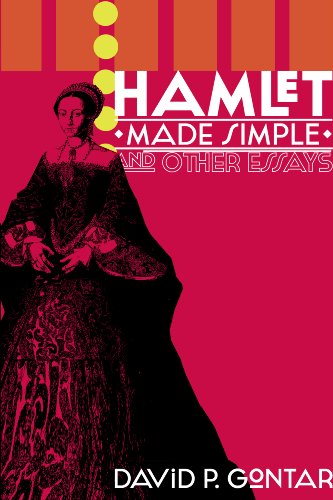I want readers to know about themselves, about life, about thinking, and how to access sources of wisdom. I support and encourage independent study for those with sufficient aptitude, interest and determination.
David P Gontar – 3 September 2019
The Back Flap
he single greatest contribution to Shakespeare scholarship in recent memory.
Hamlet Made Simple and Other Essays;
1. Presents the most compelling and original reading of Hamlet since A.C. Bradley;
2. Dispenses once and for all with the psychoanalytic interpretation of the play;
3. Explains the actual meaning of the Oedipus myth;
4. Provides the “smoking gun” which establishes Shakespeare’s true identity;
5. Explodes the fable of Shakespeare’s appearance; and
6. In the process of correcting misreadings of Shakespeare’s poetry and drama devised by a cross section of ideologies, offers vital insights and indispensable guidance on how this most challenging of writers can be fairly and productively read today.
Hamlet Made Simple and Other Essays is the definitive exposition of Shakespeare in our time. Nothing else compares.
About the book
What is the book about?
This is a two volume book about Shakespeare, the meaning of his plays and poems and how to read them deeply and fruitfully.
When did you start writing the book?
Composition began in 2008 when I lectured on Hamlet at a scholarly conference at Concordia University in Portland.
How long did it take you to write it?
2008-2015
Where did you get the idea from?
The writing of Harold Bloom of Yale was certainly an influence insofar as he is a “public critic” who avoids academic jargon and French philosophy in approaching Shakespeare. But he is also criticized in my chapters along with many others.
Were there any parts of the book where you struggled?
The project was an inspired one. I wrote and published in New English Review an entire scholarly essay on Shakespeare monthly. No one has ever done this, before or after me.
Are your characters entirely fictitious or have you borrowed from real world people you know?
The characters I write about are Shakespeare’s characters, and many of them are historical personages treated in dramatic fiction.
We all know how important it is for writers to read. Are there any particular authors that have influenced how you write and, if so, how have they influenced you?
Like all Shakespeare scholars I read as widely as I can. Harold Bloom is the major influence. My remote location makes it difficult to obtain the sources I need. Some years back I visited Oxford and Cambridge and acquired many texts.
About Writing
Do you have a writing process? If so can you please describe it?
I usually focus on one play or a group of plays, re-read them, listen to recordings, and survey the scholarly literature. Often that literature is misguided and I go about showing how to read more fairly and more rewardingly.
Do you outline? If so, do you do so extensively or just chapter headings and a couple of sentences?
Yes, the outline is ordinarily an evolving one.
Do you edit as you go or wait until you’ve finished?
Editing is ongoing until the book goes to press.
Do you listen to music while you write? If yes, what gets the fingers tapping?
Yes, I listened to music, but now YouTube is forbidden where I live, so there is far less music available.
About Publishing
Did you submit your work to Agents?
No. I became a monthly columnist for New English Review, with stories, poetry and essays on Shakespeare.
What made you decide to go Indie, whether self-publishing or with an indie publisher?
The point of view and method I employ are controversial and often censored in academe.
Was it a particular event or a gradual process?
Everything evolves except insight.
Did you get your book cover professionally done or did you do it yourself?
New English Review Press furnished two wonderful covers by Kendra Mallock.
Do you have a marketing plan for the book or are you just winging it?
Unfortunately, the books are print-on-demand and are not in stores. They are not given substantial reviews by competent professionals in the field.
Any advice that you would like to give to other newbies considering becoming Indie authors?
Be wary of print-on-demand publishers. This mode of publication creates major headaches.
About You
Where did you grow up?
I was born in New York and attended high school in Connecticut.
Where do you live now?
I am currently living in Inner Mongolia in the north of China.
What would you like readers to know about you?
Well, I have a Ph.D. in philosophy from Tulane University and a J.D. from Loyola Law School. I practiced law in Louisiana and southern California for thirty years, and have taught at Southern University in New Orleans and Inner Mongolia University. I have been engaged in the study of Shakespeare for 26 years.
But what I would like readers to know is not about me. I want readers to know about themselves, about life, about thinking, and how to access sources of wisdom. I support and encourage independent study for those with sufficient aptitude, interest and determination. The obstacles to learning are many, and most alleyways are blind. But there are great teachers and writers waiting for us to find them, and when we do the bond can be the focus of our lives as we grow and mature as resolute and compassionate human beings. Many are fortunate enough to forge a relationship with Shakespeare, not the base cullion of Stratford-upon-Avon, but the author of the poems and plays. He is out there, in those wonderful plays, ready to embrace you and be your guide. Good luck!
End of Interview:
Get your copy of Hamlet Made Simple and Other Essays from Amazon US or Amazon UK.

